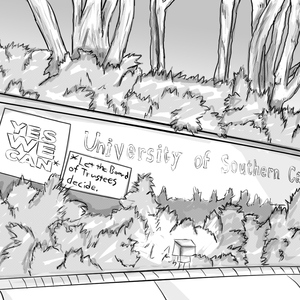Students should have input in successor
On Monday, USC President Steven B. Sample announced his retirement in August, bringing an end to a 19-year tenure marked by great achievement in the academic, athletic and financial profiles of the university.
The progress made under Sample’s leadership is easily quantifiable — the school’s ranking has risen from 51st to a highly respectable 26th in the hallowed US News & World’s annual college rankings, increased it’s endowment to nearly $4 billion pre-recession and decreased admissions rates in a manner that mirrors the exclusivity of some of the city’s high-end nightclubs.
In short, Sample’s departure will undoubtedly leave the proverbial huge shoes for his replacement to fill.
Sample’s retirement, will quickly shift the focus from a look at his Herculean list of accomplishments to questions surrounding the appointment of his successor.
The university has set a May deadline to decide on a replacement for Sample, giving the Board of Trustees seven months to complete the arduous task of appointing the 11th president of USC.
As the process matures, a list of names will come to the forefront and emerge as front-runners for the position. From there, it’s obvious that a tough decision will have to be made.
While the onus can and should rest in the laps of the university trustees, who better to help than the students who will feel the effects of every decision made by the university president?
With chants of “Yes we can!” still freshly resonating in our ears following the giant groundswell of youth support in the 2008 presidential election, it would behoove committee members to allow students to have an input in the selection process.
After all, without the nearly 34,000 faces that make up the student body, there would be no need for a university president.
Although there are few specifics on how the search process will be conducted, it does not appear very likely that the university’s Board of Trustees would open up the floodgates to a torrent of student opinion.
This comes as little surprise, seeing how students had no role in the hiring process of any of the athletic department’s recent coaching searches; it seems foolish to assume that a presidential employment search would be any more accessible.
Perhaps it’s with good reason — few could argue that the general undergraduate population would be a proper evaluator of administrative competency. The people best qualified to make an informed decision would be those who interacted with the president on a regular basis, ruling out the vast majority of the student population.
Realistically, though, what’s the worst that could happen if student voices chimed into the conversation?
While maintaining a healthy relationship with the student body only constitutes a portion of the overall duties of any university president, ultimately all administrative decisions to improve the standing and reputation of the university as a whole will reflect upon its students.
Further, there’s no surefire formula to predict a president’s success. In sifting through a pool of those with backgrounds in higher education, we can only hope to find a candidate that appears to be the most prepared to handle the smorgasbord of jobs and responsibilities associated with the position.
Despite accumulating a trophy case of accolades during his career, Sample himself started off better known for his work in the field of electrical engineering before serving as president of SUNY Buffalo.
Ultimately, only responses to the uncontrollable, wild-card elements that occur during the next president’s tenure will come to reveal his or her true value as a leader, not unlike measuring the value of the president of the United States.
Along the same lines, although many see the popular vote system of the presidential election as a sham and incapable of truly influencing the eventual decisions of the electoral college, voters still flock to the polls, preferring to have their say than find themselves disenfranchised.
Students have arguably enough of a financial stake in the university by way of the tuition paid every year, so one might even be as bold as to channel the “taxation without representation” sentiment of the American Revolution to argue for the inclusion of a student voice in the decision-making process.
It is clear the student body should not have the last word on the selection process. The Board of Trustees tasked with preserving the welfare of the university is more than sufficiently capable of making decisions in the best net interest of all parties involved.
But if the task of finding a suitable replacement for Sample truly is the long and winding uphill climb that it appears to be, wouldn’t it be better to have some company?
Soojin Yoon is a junior majoring in public relations. His column, “Boy Meets Word,” runs Thursdays.

